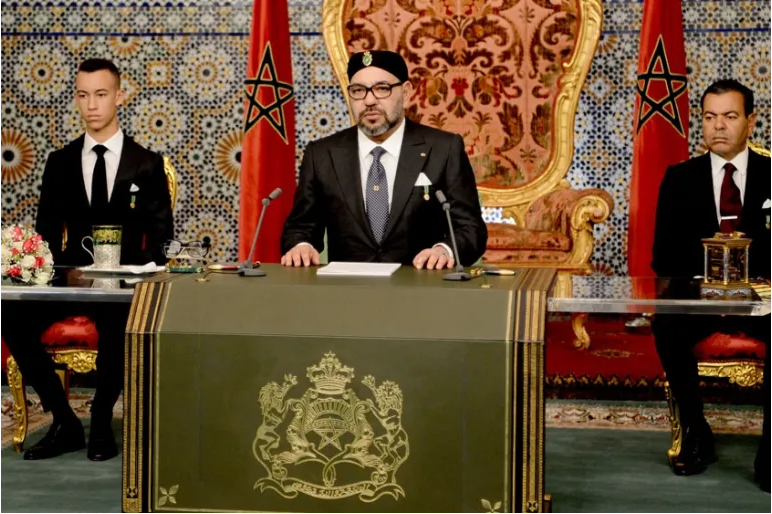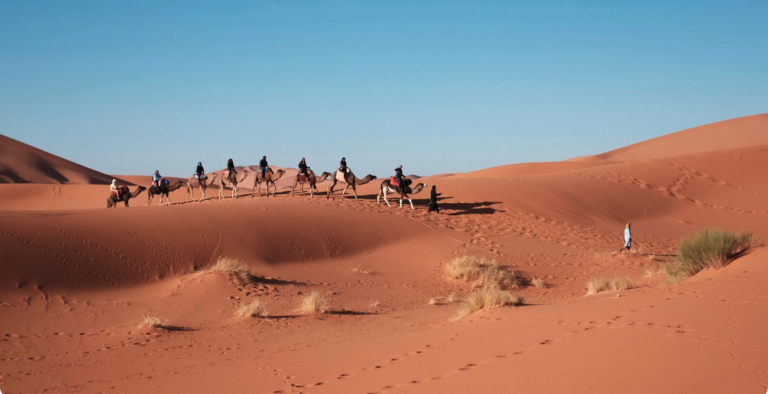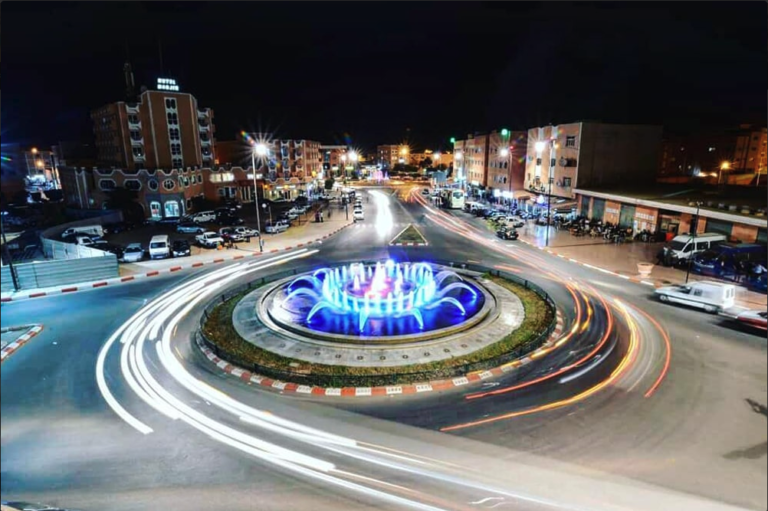Like a master craftsman meticulously carving a masterpiece from stone, King Mohammed VI has spent the past two decades shaping Morocco into a nation that is both modern and rooted in its rich history. Under his reign, the country has witnessed remarkable progress in various sectors, from economic growth and stability to infrastructural advancements, education reforms, healthcare improvements, and social development. With each passing year, King Mohammed VI’s unwavering dedication to transforming Morocco into a prosperous and inclusive society becomes clearer.
From the moment he ascended to the throne in 1999, King Mohammed VI set an ambitious vision for Morocco’s economic future. Through strategic planning and bold initiatives, he successfully steered the country towards sustained growth and stability. The Moroccan economy flourished under his leadership, attracting foreign investment while also prioritizing job creation for its citizens. As a result, Morocco emerged as one of Africa’s leading economies with increased GDP per capita and reduced poverty rates.
In addition to economic prosperity, King Mohammed VI recognized the importance of investing in infrastructure as a means to propel Morocco forward. His visionary approach led to significant infrastructural advancements across the kingdom. State-of-the-art highways now connect major cities like Casablanca and Marrakech with seamless efficiency. Modernized ports have transformed coastal regions into thriving trade hubs. Moreover, renewable energy projects such as wind farms and solar power plants have not only bolstered Morocco’s energy independence but also positioned it as a global leader in sustainable development.
Throughout his reign, education has been at the forefront of King Mohammed VI’s agenda. Recognizing that educated citizens are vital for national progress, he implemented comprehensive reforms aimed at improving access to quality education for all Moroccans. Significant investments were made in schools and universities while curriculum enhancements focused on fostering critical thinking skills and promoting innovation. As a result, literacy rates rose significantly over the past two decades, paving the way for a more knowledgeable and skilled workforce.
Furthermore, King Mohammed VI’s commitment to healthcare reforms has led to significant improvements in the country’s medical sector. Accessible and affordable healthcare services became a reality for millions of Moroccans through the expansion of health infrastructure and the implementation of comprehensive health insurance programs. From rural communities to urban centers, citizens now have access to quality healthcare facilities equipped with modern technology, ensuring their well-being is prioritized.
Lastly, social progress under King Mohammed VI’s reign has been remarkable. Through various initiatives and policies, he has made significant strides in promoting social development. Whether it is women’s empowerment, human rights, or cultural preservation, King Mohammed VI has championed causes that have positively impacted Moroccan society. His commitment to creating a more inclusive and equal society is evident in the progress made in these areas.
In conclusion, King Mohammed VI’s reign has been marked by transformative progress in Morocco. His visionary leadership and dedication to the well-being of his people have laid the foundation for a prosperous and inclusive society. With each passing year, the legacy of his reign becomes more apparent, as Morocco continues to thrive and make strides towards a brighter future.
Key Takeaways
- Economic growth and development: King Mohammed VI’s reign has led to significant economic growth and stability in Morocco. The country has become one of Africa’s leading economies, with increased GDP per capita and reduced poverty rates. Foreign investments, thriving industries, and policies supporting entrepreneurship have driven economic expansion and created job opportunities.
- Infrastructure advancements: Under King Mohammed VI’s leadership, Morocco has made significant infrastructural advancements. State-of-the-art highways, modernized ports, and renewable energy projects have been implemented, improving transportation and energy sectors in the country. Modernized airports, expanded railway networks, and upgraded highways have also improved the overall infrastructure.
- Education reforms and improved literacy rates: The education sector in Morocco has undergone reforms aimed at improving access to quality education and fostering critical thinking skills. These reforms have resulted in significant improvements in literacy rates over the past two decades. The focus on teacher training and curriculum development aims to provide students with a well-rounded education for success in various fields.
- Healthcare and social progress: King Mohammed VI’s reign has brought accessible and affordable healthcare services to millions of Moroccans through healthcare reforms. Additionally, initiatives for women’s empowerment, human rights, and cultural preservation have been implemented, contributing to social progress in the country.
Economic Growth and Stability
The Moroccan economy has experienced remarkable growth and stability under King Mohammed VI’s reign. Foreign investments have played a crucial role in this progress, with numerous international companies choosing to invest in Morocco’s various sectors. These investments have driven economic expansion and created job opportunities for the Moroccan people.
Foreign investments have poured into industries such as tourism, manufacturing, and renewable energy. This influx of capital has allowed for the development of world-class resorts, the establishment of factories producing goods for export, and the implementation of sustainable energy projects. As a result, these sectors have thrived, contributing significantly to Morocco’s GDP growth.
Alongside foreign investments, job creation has been a priority during King Mohammed VI’s reign. The government has implemented policies that support entrepreneurship and attract businesses to set up operations in Morocco. These initiatives have not only resulted in increased employment opportunities but also fostered a culture of innovation and creativity among Moroccan entrepreneurs.
Under King Mohammed VI’s leadership, the Moroccan economy has experienced substantial growth and stability. Thanks to foreign investments across various sectors and measures taken to promote job creation, Morocco has become an attractive destination for global investors while ensuring its citizens benefit from increased employment opportunities.
Infrastructural Advancements
Witness the remarkable transformation of infrastructure under King Mohammed VI’s visionary leadership, where every road becomes a pathway to progress and bridges connect communities like never before.
In the past two decades, Morocco has witnessed significant advancements in its infrastructural development. One notable achievement is the creation of smart cities that harness technology to improve the quality of life for residents. These cities are equipped with state-of-the-art amenities, including advanced transportation systems that ensure efficient mobility within and between urban areas.
One prime example of these smart cities is Rabat-Salé, which has become a model for sustainable urban living. The city boasts an integrated transportation system that seamlessly connects different modes of transport such as buses, trams, and bicycle lanes. This not only reduces congestion on roads but also promotes eco-friendly commuting options. Additionally, Rabat-Salé has implemented smart traffic management systems that use real-time data to optimize traffic flow and minimize delays. These initiatives have transformed the city into a more livable and environmentally conscious place.
Another noteworthy aspect of Morocco’s infrastructural advancements is the improvement in transportation systems across the country. Under King Mohammed VI’s reign, major investments have been made to enhance connectivity through modernizing airports, expanding railway networks, and upgrading highways. This has greatly facilitated travel within Morocco and boosted tourism by making it easier for visitors to explore different regions. Furthermore, these improvements have stimulated economic growth by enabling faster movement of goods and services.
King Mohammed VI’s visionary leadership has brought about remarkable changes in Morocco’s infrastructure over the past two decades. Through the establishment of smart cities and advancements in transportation systems, the country has become more connected than ever before. These developments not only improve residents’ quality of life but also contribute to sustainable urbanization and economic growth.
As Morocco continues on this path of progress under King Mohammed VI’s guidance, it’s poised to further solidify its position as a regional leader in infrastructure development.
Education Reforms
Experience the transformative power of education reforms in Morocco, where students are empowered with knowledge and opportunities for a brighter future. Over the past two decades of King Mohammed VI’s reign, significant efforts have been made to improve the country’s education system. One key aspect of these reforms has been teacher training. By investing in professional development programs for educators, Morocco aims to enhance teaching methods and ensure that teachers are equipped with the necessary skills to deliver quality education.
Curriculum development has also played a crucial role in shaping the educational landscape in Morocco. The government has focused on updating and modernizing the curriculum to align it with international standards and meet the needs of a rapidly changing world. This includes incorporating new subjects such as computer science and entrepreneurship, as well as emphasizing critical thinking and problem-solving skills. The aim is to provide students with a well-rounded education that prepares them for success in various fields.
To convey a deeper understanding of these reforms, let’s take a closer look at their impact through a table:
| Teacher Training | Curriculum Development |
|---|---|
| – Professional development programs for teachers | – Updated curriculum aligned with international standards |
| – Enhanced teaching methods | – Introduction of new subjects such as computer science |
| – Equipping teachers with necessary skills | – Emphasis on critical thinking and problem-solving skills |
These educational reforms have had far-reaching effects on Moroccan society. They have not only improved academic outcomes but also contributed to reducing social inequalities by providing equal access to quality education for all students. Through investment in teacher training and curriculum development, Morocco is paving the way for its students’ success while ensuring they are prepared for an increasingly competitive globalized world.
Healthcare Reforms
Explore the remarkable impact of healthcare reforms in Morocco, where you’ll discover an enhanced and accessible healthcare system that prioritizes the well-being and health of its citizens. Under the visionary leadership of King Mohammed VI, Morocco has made significant strides in achieving universal coverage, ensuring that every citizen has access to essential healthcare services.
Through a comprehensive overhaul of the healthcare system, the government has been able to provide quality medical care to all Moroccans, irrespective of their socio-economic status.
One of the key aspects of healthcare reforms in Morocco is the focus on healthcare funding. The government has implemented various measures to ensure sustainable financing for the healthcare sector. By increasing investment in public hospitals and clinics, as well as improving infrastructure and technology, Morocco has been able to enhance its capacity to deliver efficient and effective healthcare services. Additionally, innovative financing mechanisms such as health insurance schemes have been introduced to further support universal coverage and reduce out-of-pocket expenses for patients.
The results of these reforms are evident in improved health outcomes across the country. Accessible primary care facilities have been established in remote areas, ensuring that even those living in rural communities can receive timely medical attention. Furthermore, specialized hospitals equipped with state-of-the-art equipment have been established to cater to complex medical conditions. This comprehensive approach towards healthcare reform has not only improved access but also significantly raised the standard of care provided throughout Morocco.
Under King Mohammed VI’s reign, healthcare reforms in Morocco have achieved remarkable progress by prioritizing universal coverage and sustainable funding for a more accessible and efficient healthcare system. The commitment towards providing quality medical care for all citizens is evident through increased investments and innovative financing mechanisms. With improved infrastructure and expanded primary care facilities reaching even remote areas, Morocco’s healthcare system continues to evolve towards better health outcomes for its citizens.
Social Progress
With a focus on improving the well-being of its citizens, Morocco has achieved significant advancements in social progress. Under the reign of King Mohammed VI, the country has made great strides towards achieving gender equality. Women’s rights have been strengthened through legal reforms that promote equal opportunities for both genders and protect women from discrimination.
Additionally, initiatives have been implemented to increase women’s participation in politics and decision-making processes.
Cultural preservation is another area where Morocco has made remarkable progress. The government recognizes the importance of preserving its rich cultural heritage and promoting cultural diversity. Efforts have been made to safeguard traditional arts, crafts, and music by providing support and resources to local artisans and musicians. Furthermore, cultural festivals and events are organized throughout the country to celebrate Morocco’s diverse traditions and bring communities together.
In addition to gender equality and cultural preservation, Morocco has also focused on improving social welfare programs. The government has implemented policies aimed at reducing poverty rates, improving access to education, healthcare services, housing, and clean water. These efforts have resulted in improved living conditions for many Moroccans.
Overall, under King Mohammed VI’s reign, Morocco has shown a strong commitment to social progress. Through initiatives promoting gender equality, cultural preservation, and improvements in social welfare programs, the country continues to make significant advancements towards a more inclusive society where all citizens can thrive.
Conclusion
In conclusion, over the past two decades of King Mohammed VI’s reign, Morocco has witnessed significant progress in various sectors.
The country’s economy has experienced substantial growth and stability, attracting foreign investments and creating employment opportunities for its citizens.
The government’s focus on infrastructural advancements has resulted in the development of modern transportation networks, including highways and high-speed railways, which have facilitated trade and connectivity within the country.
Furthermore, education reforms have aimed to enhance the quality of education by introducing new curricula and improving school infrastructure.
These efforts have contributed to an increase in literacy rates and provided better educational opportunities for young Moroccans.
Similarly, healthcare reforms have been implemented to ensure accessible and affordable healthcare services for all citizens, leading to improved health outcomes nationwide.
Moreover, Morocco has made notable social progress under King Mohammed VI’s leadership.
Initiatives such as promoting gender equality and empowerment have empowered women in various fields of society.
Additionally, steps towards strengthening civil society institutions have fostered a more inclusive and participatory democracy.
To put it simply, King Mohammed VI’s reign can be likened to a master craftsman skillfully molding a piece of clay into a magnificent sculpture that stands tall with pride.
His unwavering commitment to economic growth, infrastructural advancements, education reforms, healthcare improvements, and social progress has transformed Morocco into a flourishing nation that is ready to embrace the challenges of the future.
As we look ahead with optimism towards what lies beyond these two decades of accomplishments under his reign, it is clear that Morocco is well-positioned for continued success on its path towards prosperity and development.

The Editorial Team is a passionate group of Morocco enthusiasts dedicated to sharing the beauty, culture, and wonders of this captivating country. With diverse backgrounds and a deep love for travel, we strive to bring you engaging and informative content that inspires your Moroccan adventures. From uncovering hidden gems and sharing local insights to exploring mouthwatering cuisine and showcasing the vibrant lifestyle, our team is committed to providing you with valuable resources and exciting stories that enhance your exploration of Morocco. Join us on this journey as we celebrate the rich heritage and unforgettable experiences that make Morocco truly special.



